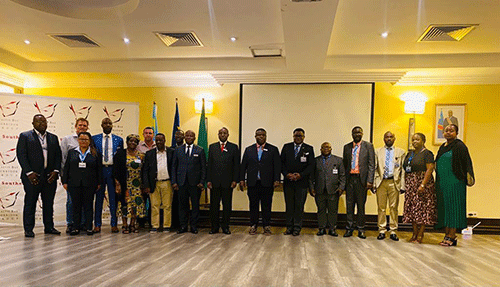The Democratic Republic of Congo (DRC) recently hosted the 12th Walvis Bay-Ndola-Lubumbashi Development Corridor (WBNLDC) Tripartite Meeting.
Transport ministers, senior government officials, technical experts as well as the private sector from the member states of Namibia, Zambia, and the DRC attended it.
Facilitated by the Walvis Bay Corridor Group (WBCG), the tripartite meeting aims at reviewing progress in the implementation of the WBNLDC tripartite agreement, which was signed in 2010.
Speaking during the official opening ceremony, Governor of Haut Katanga Province in Lubumbashi, DRC, Jacques Kyabula Katwe, underscored the development of mining and the local market for goods and services, which saw an increase of volumes from Walvis Bay via Zambia to DRC.
He emphasised that the revitalisation of the WBNLDC was necessary for the DRC, as it brings access routes via Zambia to DRC. This revitalisation was also imperative for regional cooperation and trade between DRC and Namibia.
Recent developments in the member states and regional economic communities pertaining to trade facilitation matters along the corridor were highlighted. The tripartite indaba discussed the urgent need to harmonise transit fees and cross border charges as recommended by the various regional economic communities, the extension of border operating hours, and the need for ratification of the WBNLDC tripartite agreement by the Republic of Zambia.
Furthermore, the need to find an urgent solution to parking space for truckers and migration to the One-Stop Border Post framework, which is a relevant ingredient for enhanced regional integration through trade. With regard to immigration matters, the meeting recommended that Namibia should open a diplomatic consulate in Lubumbashi to ease trade and the issuance of visas.
Mbahupu Tjivikua, the chief executive officer of the WBCG highlighted that the tripartite meeting was held in one of the most strategic places in the region, namely the Haut Katanga Province.
He shared that the WBNLDC is an important trade artery and an economic lifeline for the Port of Walvis Bay and all the supporting infrastructure such as the Katima Mulilo/Sesheke border, the new Kazungula One-Stop Border Post (OSBP) and the mighty Kasumbalesa OSBP, which he referred to as the “Mother of all border crossings in Africa”. He emphasised that the WBNLDC is no longer an alternative trade route to Zambia and the DRC but rather a preferred trade route.
“It is, therefore, the duty of all of us in attendance that we eliminate all these bottlenecks and impediments to trade. Our children are watching us and they would hold us accountable for our inaction and indecision in improving their livelihoods. It is our duty to improve on the ease of doing business and improve the standard of living of the general population of Africa,” said Tjivikua.
The meeting also considered possible sustainable funding mechanisms for the establishment of the permanent WBNLDC Secretariat.
The secretariat, which is currently hosted by the WBCG, seeks to facilitate the removal of physical and non-physical barriers to the movement of goods and people transiting through Namibia, Zambia and the DRC. The committee’s activities are premised on the need to improve operational efficiencies and reduce costs of doing business along the corridor.
The meeting was concluded with an information sharing session. The tripartite meeting took place from 16 to 18 March 2022 at the Pullman Grand Karavia Hotel in Lubumbashi, DRC. The next tripartite meeting is scheduled to be held in Livingstone, Zambia in 2023.


